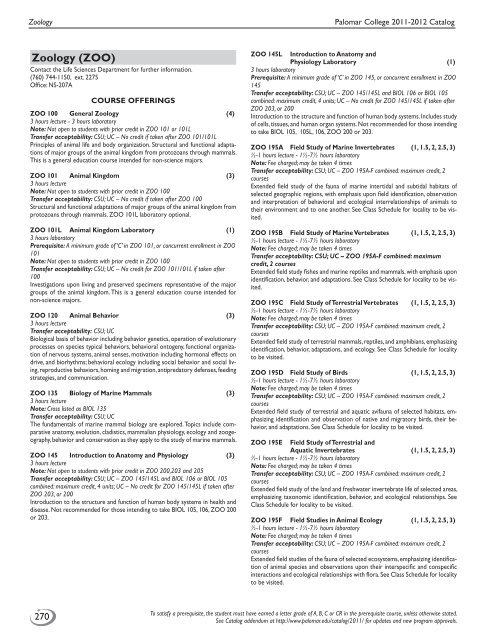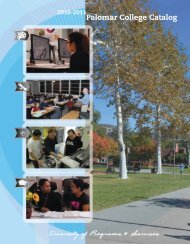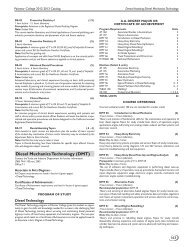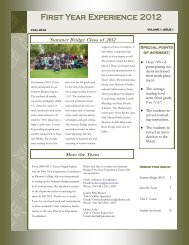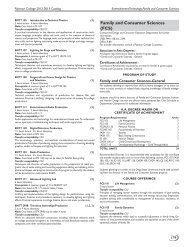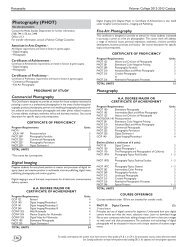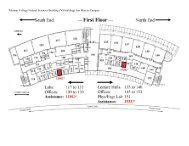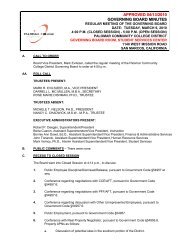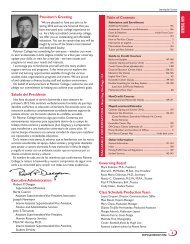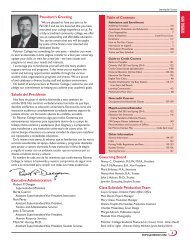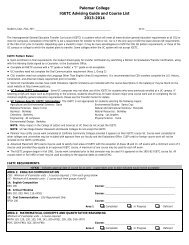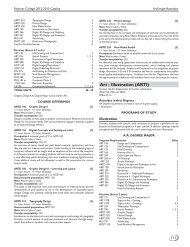Zoology (ZOO) - Palomar College
Zoology (ZOO) - Palomar College
Zoology (ZOO) - Palomar College
Create successful ePaper yourself
Turn your PDF publications into a flip-book with our unique Google optimized e-Paper software.
<strong>Zoology</strong><br />
<strong>Palomar</strong> <strong>College</strong> 2011-2012 Catalog<br />
<strong>Zoology</strong> (<strong>ZOO</strong>)<br />
Contact the Life Sciences Department for further information.<br />
(760) 744-1150, ext. 2275<br />
Office: NS-207A<br />
COURSE OFFERINGS<br />
<strong>ZOO</strong> 100 General <strong>Zoology</strong> (4)<br />
3 hours lecture - 3 hours laboratory<br />
Note: Not open to students with prior credit in <strong>ZOO</strong> 101 or 101L<br />
Transfer acceptability: CSU; UC – No credit if taken after <strong>ZOO</strong> 101/101L<br />
Principles of animal life and body organization. Structural and functional adaptations<br />
of major groups of the animal kingdom from protozoans through mammals.<br />
This is a general education course intended for non-science majors.<br />
<strong>ZOO</strong> 101 Animal Kingdom (3)<br />
3 hours lecture<br />
Note: Not open to students with prior credit in <strong>ZOO</strong> 100<br />
Transfer acceptability: CSU; UC – No credit if taken after <strong>ZOO</strong> 100<br />
Structural and functional adaptations of major groups of the animal kingdom from<br />
protozoans through mammals. <strong>ZOO</strong> 101L laboratory optional.<br />
<strong>ZOO</strong> 101L Animal Kingdom Laboratory (1)<br />
3 hours laboratory<br />
Prerequisite: A minimum grade of ‘C’ in <strong>ZOO</strong> 101, or concurrent enrollment in <strong>ZOO</strong><br />
101<br />
Note: Not open to students with prior credit in <strong>ZOO</strong> 100<br />
Transfer acceptability: CSU; UC – No credit for <strong>ZOO</strong> 101/101L if taken after<br />
100<br />
Investigations upon living and preserved specimens representative of the major<br />
groups of the animal kingdom. This is a general education course intended for<br />
non-science majors.<br />
<strong>ZOO</strong> 120 Animal Behavior (3)<br />
3 hours lecture<br />
Transfer acceptability: CSU; UC<br />
Biological basis of behavior including behavior genetics, operation of evolutionary<br />
processes on species typical behaviors, behavioral ontogeny, functional organization<br />
of nervous systems, animal senses, motivation including hormonal effects on<br />
drive, and biorhythms; behavioral ecology including social behavior and social living,<br />
reproductive behaviors, homing and migration, antipredatory defenses, feeding<br />
strategies, and communication.<br />
<strong>ZOO</strong> 135 Biology of Marine Mammals (3)<br />
3 hours lecture<br />
Note: Cross listed as BIOL 135<br />
Transfer acceptability: CSU; UC<br />
The fundamentals of marine mammal biology are explored. Topics include comparative<br />
anatomy, evolution, cladistics, mammalian physiology, ecology and zoogeography,<br />
behavior and conservation as they apply to the study of marine mammals.<br />
<strong>ZOO</strong> 145 Introduction to Anatomy and Physiology (3)<br />
3 hours lecture<br />
Note: Not open to students with prior credit in <strong>ZOO</strong> 200,203 and 205<br />
Transfer acceptability: CSU; UC – <strong>ZOO</strong> 145/145L and BIOL 106 or BIOL 105<br />
combined: maximum credit, 4 units; UC – No credit for <strong>ZOO</strong> 145/145L if taken after<br />
<strong>ZOO</strong> 203, or 200<br />
Introduction to the structure and function of human body systems in health and<br />
disease. Not recommended for those intending to take BIOL 105, 106, <strong>ZOO</strong> 200<br />
or 203.<br />
<strong>ZOO</strong> 145L Introduction to Anatomy and<br />
Physiology Laboratory (1)<br />
3 hours laboratory<br />
Prerequisite: A minimum grade of ‘C’ in <strong>ZOO</strong> 145, or concurrent enrollment in <strong>ZOO</strong><br />
145<br />
Transfer acceptability: CSU; UC – <strong>ZOO</strong> 145/145L and BIOL 106 or BIOL 105<br />
combined: maximum credit, 4 units; UC – No credit for <strong>ZOO</strong> 145/145L if taken after<br />
<strong>ZOO</strong> 203, or 200<br />
Introduction to the structure and function of human body systems. Includes study<br />
of cells, tissues, and human organ systems. Not recommended for those intending<br />
to take BIOL 105, 105L, 106, <strong>ZOO</strong> 200 or 203.<br />
<strong>ZOO</strong> 195A Field Study of Marine Invertebrates (1, 1.5, 2, 2.5, 3)<br />
½-1 hours lecture - 1½-7½ hours laboratory<br />
Note: Fee charged; may be taken 4 times<br />
Transfer acceptability: CSU; UC – <strong>ZOO</strong> 195A-F combined: maximum credit, 2<br />
courses<br />
Extended field study of the fauna of marine intertidal and subtidal habitats of<br />
selected geographic regions, with emphasis upon field identification, observation<br />
and interpretation of behavioral and ecological interrelationships of animals to<br />
their environment and to one another. See Class Schedule for locality to be visited.<br />
<strong>ZOO</strong> 195B Field Study of Marine Vertebrates (1, 1.5, 2, 2.5, 3)<br />
½-1 hours lecture - 1½-7½ hours laboratory<br />
Note: Fee charged; may be taken 4 times<br />
Transfer acceptability: CSU; UC – <strong>ZOO</strong> 195A-F combined: maximum<br />
credit, 2 courses<br />
Extended field study fishes and marine reptiles and mammals, with emphasis upon<br />
identification, behavior, and adaptations. See Class Schedule for locality to be visited.<br />
<strong>ZOO</strong> 195C Field Study of Terrestrial Vertebrates (1, 1.5, 2, 2.5, 3)<br />
½-1 hours lecture - 1½-7½ hours laboratory<br />
Note: Fee charged; may be taken 4 times<br />
Transfer acceptability: CSU; UC – <strong>ZOO</strong> 195A-F combined: maximum credit, 2<br />
courses<br />
Extended field study of terrestrial mammals, reptiles, and amphibians, emphasizing<br />
identification, behavior, adaptations, and ecology. See Class Schedule for locality<br />
to be visited.<br />
<strong>ZOO</strong> 195D Field Study of Birds (1, 1.5, 2, 2.5, 3)<br />
½-1 hours lecture - 1½-7½ hours laboratory<br />
Note: Fee charged; may be taken 4 times<br />
Transfer acceptability: CSU; UC – <strong>ZOO</strong> 195A-F combined: maximum credit, 2<br />
courses<br />
Extended field study of terrestrial and aquatic avifauna of selected habitats, emphasizing<br />
identification and observation of native and migratory birds, their behavior,<br />
and adaptations. See Class Schedule for locality to be visited.<br />
<strong>ZOO</strong> 195E Field Study of Terrestrial and<br />
Aquatic Invertebrates (1, 1.5, 2, 2.5, 3)<br />
½-1 hours lecture - 1½-7½ hours laboratory<br />
Note: Fee charged; may be taken 4 times<br />
Transfer acceptability: CSU; UC – <strong>ZOO</strong> 195A-F combined: maximum credit, 2<br />
courses<br />
Extended field study of the land and freshwater invertebrate life of selected areas,<br />
emphasizing taxonomic identification, behavior, and ecological relationships. See<br />
Class Schedule for locality to be visited.<br />
<strong>ZOO</strong> 195F Field Studies in Animal Ecology (1, 1.5, 2, 2.5, 3)<br />
½-1 hours lecture - 1½-7½ hours laboratory<br />
Note: Fee charged; may be taken 4 times<br />
Transfer acceptability: CSU; UC – <strong>ZOO</strong> 195A-F combined: maximum credit, 2<br />
courses<br />
Extended field studies of the fauna of selected ecosystems, emphasizing identification<br />
of animal species and observations upon their interspecific and conspecific<br />
interactions and ecological relationships with flora. See Class Schedule for locality<br />
to be visited.<br />
270<br />
To satisfy a prerequisite, the student must have earned a letter grade of A, B, C or CR in the prerequisite course, unless otherwise stated.<br />
See Catalog addendum at http://www.palomar.edu/catalog/2011/ for updates and new program approvals.
<strong>Palomar</strong> <strong>College</strong> 2011-2012 Catalog<br />
<strong>Zoology</strong><br />
<strong>ZOO</strong> 197 <strong>Zoology</strong> Topics (.5 - 4)<br />
Units awarded in topics courses are dependent upon the number of hours required<br />
of the student. Any combination of lecture and/or laboratory may be scheduled by the<br />
department. Refer to Class Schedule.<br />
Note: May be taken 4 times<br />
Transfer acceptability: CSU; UC – Credit determined by UC upon review of course<br />
syllabus<br />
Topics in <strong>Zoology</strong>. See Class Schedule for specific topic offered. Course title will<br />
designate subject covered.<br />
<strong>ZOO</strong> 200 Anatomy (4)<br />
2 hours lecture - 7 hours laboratory<br />
Prerequisite: A minimum grade of ‘C’ in BIOL 102; or BIOL 200; or BIOL 100; or<br />
BIOL 101 and 101L; or BIOL 105<br />
Transfer acceptability: CSU; UC<br />
Designed to provide a basic understanding of the structure of the human body.<br />
Laboratory includes a study of anatomy through cat and organ dissection, skeletal<br />
study, use of models and other visual aids.<br />
<strong>ZOO</strong> 203 Physiology (4)<br />
2 hours lecture - 7 hours laboratory<br />
Prerequisite: A minimum grade of ‘C’ in BIOL 102; or BIOL 200 and CHEM 104<br />
or CHEM 100; or BIOL 100 and CHEM 104 or CHEM 100; or BIOL 105 and CHEM<br />
104 or CHEM 100; or equivalent<br />
Transfer acceptability: CSU; UC<br />
Principles of human physiology including laboratory exercises. Deals with physiology<br />
of muscle, nerve, circulation, respiration, excretion, digestion, the endocrines<br />
and exercise.<br />
<strong>ZOO</strong> 295 Directed Study in <strong>Zoology</strong> (1, 2, 3)<br />
3, 6, or 9 hours laboratory<br />
Prerequisite: Approval of project or research by department chairperson<br />
Note: May be taken 4 times<br />
Transfer acceptability: CSU; UC – Credit determined by UC upon review of course<br />
syllabus<br />
Independent study for students who have demonstrated skills and/or proficiencies<br />
in <strong>Zoology</strong> subjects and have the initiative to work independently on projects<br />
or research outside the context of regularly scheduled classes. Students will work<br />
under the personal supervision of an instructor.<br />
271


